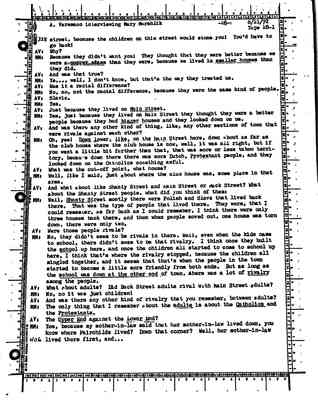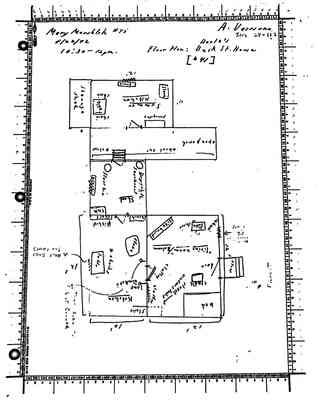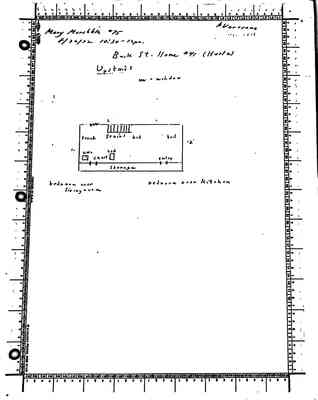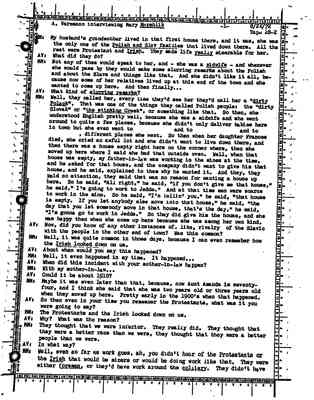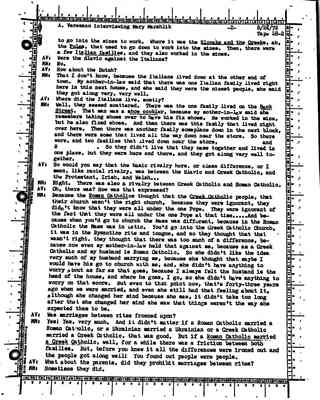Pages
28
A. Varesano interviewing Mary Marshlik -268/21/72 Tape 28-1
street, because the children on this street would stone you! You'd have to go back!
AV: Why?
MM: Because they didn't want you! They thought that they were better because we were a poorer class [underline poorer class] than they were, because we lived in smaller houses [underline smaller houses] than they did.
AV: And was that true?
MM: Ye . . . . well, I don't know, but that's the way they treated us.
AV: Was it a racial difference?
MM: No, no, not the racial difference, because they were the same kind of people.
AV: Slavic.
MM: Yes.
AV: Just because they lived on Main Street [underline Main Street].
MM: Yes, just because they lived on Main Street they thought they were a better people because they had bigger houses [underline bigger houses] and they looked down on us.
AV: And was there any other kind of thing, like, any other sections of town that were rivals against each other?
MM: Oh, yes! Down lower [underline Down lower], like [underline like], on the Main Street [underline on the Main Street] here, down about as far as the club house where the club house is now, well, it was all right, but if you went a little bit farther than that, that was more or less taboo territory, because down there there was more Dutch, Protestant [underline Dutch, Protestant] people, and they looked down on the Catholics something awful.
AV: What was the cut-off point, what house?
MM: Well, like I said, just about where the club house was, some place in that area.
AV: And what about like Shanty Street and Main Street or Back Street? What about the Shanty Street people, what did you think of them:
MM: Well, Shanty Street [underline Shanty Street] mostly there were Polish and Slavs that alived back there. That was the type of people that lived there. They were, that I could remember, as far back as I could remember, I think there were only three houses back there, and then when people moved out, one house was torn down, there were only two.
AV: Were those people rivals?
MM: No, they didn't seem to be rivals in there. Well, even when the kids came to school, there didn't seem to be that rivalry. I think once they built the school [underline school] up here, and once the children all started to come to school up here, I think that's where the rivalry stopped, because the children all mingled together, and it seems that that's when the people in the town started to become a little more friendly from both ends. But as long as the school was down at the other end [underline school was down at the other end] of town, there was a lot of rivalry [underline rivalry] among the people.
AV: What about adults? Did Back Street adults rival with Main Street adults?
MM: No, no it was just children!
AV: And was there any other kind of rivalry that you remember, between adults?
MM: The only thing that I remember about the adults [underline adults] is about the Catholics [underline Catholics] and the Protestants [underline Protestants].
AV: The Upper End [underline Upper End] against the Lower End [underline Lower End]?
MM: Yes, because my mother-in-law said that her mother-in-law lived down, you know where the Fairchilds lived? Down that corner? Well, her mother-in-law lived there first, and . . .
33
A. Varesano interviewing Mary Marshlik [underline Marshlik] -18/22/72 Tape 28-2
MM: My husband's grandmother lived in that first house there, and it was, she was the only one of the Polish and Slav families [underline Polish and Slav families] that lived down there. All the rest were Protestant and Irish [underline Irish]. They made life really [underline really] miserable for her.
AV: What did they do?
MM: Not any of them would speak to her, and - she was a midwife [underline midwife] - and whenever she would pass by they would make some slurring remarks about the Polish and about the Slavs and things like that. And she didn't like it all, because now some of her relatives lived up at this end of the town and she wanted to come up here. And then finally . . .
AV: What kind of slurring remarks [underline slurring remarks]?
MM: Well, they called her, every time they'd see her they'd call her a "dirty Polack" [underline "dirty Polack"]. That was one of the things they called Polish people: the "dirty Slovak" or "the stinking Greek" [underline "the stinking Greek"], or something like that. So then, she understood English pretty well, because she was a midwife and she went around to quite a few places, because she didn't only deliver babies here in town but she even went to [blank space] and to [blank space] and to [blank space], different places she went. So then when her daughter Frances died, she cried an awful lot and she didn't want to live down there, and then there was a house empty right here on the corner where, then she moved up here where I said she had that outside oven. Well, when that house was empty, my father-in-law was working in the mines at the time, and he asked for that house, and the company didn't want to give him that house, and he said , explained to them why he wanted it. And they, they paid no attention, they said that was no reason for wanting a house up here. So he said, "All right," he said, "if you don't give me that house," he said, "I'm going to work to Jeddo." And at that time men were scarce to work in the mine. So he said, "I'm tellin' you," he said, "that house is empty. If you let anybody else move into that house," he said, "the day that you let somebody move in that house, that's the day," he said, "I'm gonna go to work in Jeddo." So they did give him the house, and she was happy then when she come up here because she was among her own kind.
AV: Now, did you know of any other instances of, like, rivalry of the Slavic with the people in the other end of town? Was this common?
MM: Well, it was quite common in those days, because I can even remember how the Irish looked down [underline Irish looked down] on us.
AV: About when would you say this happened?
MM: Well, it even happened in my time. It happened . . .
AV: When did this incident with your mother-in-law happen?
MM: With my mother-in-law . . .
AV: Could it be about 1910?
MM: Maybe it was even later than that, because, now Aunt Amanda is seventy-four, and I think she said that she was two years old or three years old when they moved up here. Pretty early in the 1900's when that happened.
AV: So then even in your time you remember the Protestants, what was it you were going to say?
MM: The Protestants and the Irish looked down on us.
AV: Why? What was the reason?
MM: They thought that we were inferior. They really did. They thought that they were a better race than we were, they thought that they were a better people than we were.
AV: In what way?
MM: Well, even as far as work goes, ah, you didn't hear of the Protestants or the Irish [underline Irish] that would be miners or would be doing work like that. They were either foremen [underline foremen], or they'd have work around the colliery [underline colliery]. They didn't have
34
A. Varesano interviewing Mary Marshlik -38/22/72 Tape 28-2
to go into the mines to work. Where it was the Slovaks and the Greeks [underline Slovaks and the Greeks], ah, the Poles [underline Poles], that used to go down to work into the mines. Then, there were a few Italian families [underline Italian families], and they also worked in the mines.
AV: Were the Slavic against the Italians?
MM: No.
AV: How about the Dutch?
MM: That I don't know, because the Italians lived down at the other end of town. My mother-in-law said that there was one Italian family lived right here in this next house, and she said they were the nicest people, she said they got along very, very well.
AV: Where did the Italians live, mostly?
MM: Well, they seemed scattered. There was the one family lived on the Back Street [underline Back Street]. That man was a shoe cobbler [underline shoe cobbler], because my mother-in-law said she remembers taking shoes over to have him fix shoes. He worked in the mine, but he also fixed shoes. And then there was this family that lived right over here. Then there was another family someplace down in the next block, and there were some that lived all the way down near the store. So there were, and two families that lived down near the store, [blank space] and B[blank space]. So they were here and there, and they got along very well together.
AV: So would you say that the basic rivalry here, or class differences, or I mean, like racial rivalry, was between the Slavic and Greek Catholic, and the Protestant, Irish, and Welsh . . .
MM: Right. There was also a rivalry between Greek Catholic and Roman Catholic.
AV: Oh, there was? How was that expressed?
MM: Because the Roman Catholics [underline Roman Catholics] thought that the Greek Catholic [underline Greek Catholic] people, that their church wasn't the right church, because they were ignorant, they didn't know that they were all under the one Pope. They were ignorant of the fact that they were all under the one Pope at that time . . . . . And because when you'd go to church the Mass was different, because in the Roman Catholic the Mass was in Latin. You'd go into the Greek Catholic Church, it was in the Byzantine rite and tongue, and so they thought that that wasn't right, they thought that there was too much of a difference, because now even by mother-in-law held that against me, because am a Greek Catholic and my husband is Roman Catholic. So she didn't like the idea very much of my husband marrying me, because she thought that maybe I would have him go to church with me, and, she didn't have anything to worry about as far as that goes, because I always felt the husband is the head of the house, and where he goes, I go, so she didn't have anything to worry on that score. But even to that point now, that's forty-three years ago when we were married, and even she still had that feeling about it, although she changed her mind because she saw, it didn't take to long after that she changed her mind she saw that things weren't the way she expected them to be.
AV: Was marriages between rites frowned upon?
MM: Yes! Yes, very much. And it didn't matter if a Roman Catholic married a Roman Catholic, or a Ukrainian married a Ukrainian or a Greek Catholic married a Greek Catholic, that was good. But is a Roman Catholic married a Greek Catholic [underline Roman Catholic married a Greek Catholic], well, for a while there was a friction between both families. But, before you knew it all the differences were ironed out and the people got along well! You found out people were people.
AV: What about the parents, did they prohibit marriages between rites?
MM: Sometimes they did.
